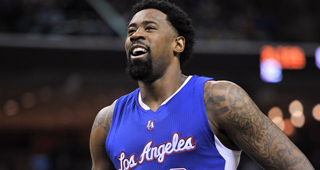Adam Silver has changed his position over the past year on intentional fouling and is committed to reform of some kind.
"I think you all know it is my hope that we are not far away from some reform," said Silver. "This is an issue where I'm hoping we can strike some sort of a compromise. I mean, there is no doubt that there are particular teams, particular owners who have spoken out against any change whatsoever. And I also recognize from a competitive standpoint that largely three teams will be the beneficiary of a rule change. There's three players in particular, and everyone knows who I'm talking about, and whatever team they're on, if they're going to play a lot of minutes and they're poor free throw shooters, the ability to hack them away from the ball creates an advantage for the other team. What our analytics tell us is it's not as big an advantage as some might think, but it's an advantage. And it's my job to look out for the greater good of the game.
"I think, first of all, in response to people who say guys have to make their free throws -- and I was one of them. I think I acknowledged to everyone last summer that I was on the fence. What we've seen even since last year is a two and a half times increase off last year of the number of these off-ball fouls, away-from-the-ball fouls, intentional fouls. Looking back just even at the last five years, it's now up 16 times from five years ago. So on one hand, of course, I want guys to be able to make their free throws. But what you see is even among those three players who are the poorest freethrow shooters of the ones that get hacked the most, something like two-thirds of their free throws still involve plays around the ball. In other words, plays that would not be impacted by a rule change. So they still have on their teams every incentive for them to become better free throw shooters.
"One statistic I find fascinating is that if you look back over the last 50 years of the NBA, average percentage of free-throw shooting has remained at 75%. I mean, it's quite remarkable. Slight deviations. It goes 75.2, 74.8, and I'm not sure what that ultimately tells you. It may say that on average it's very difficult to improve free throw shooting and therefore statistically we're always going to have some bad free throw shooters in this league. Then the question is: Is there a compromise? I mean, in order to change a playing rule, it requires two-thirds of the teams voting in favor of it, and the commissioner does not get a vote. So all I have is sort of the bully pulpit to make recommendations to them.
"Part of my job, too, is not to just to look at the competition but the business implications as well. I've said it before, for example, when Hack-a-Shaq has done something like more than roughly ten times a game, it adds about 15 minutes to the length of the game. Not only is that something that is bad for our network partners, but for all of the fan research we have shows that the fans hate it. You know, so there may be a compromise in there where we can cut it down significantly. It still remains an advantage for those teams that don't have one of those players or, said differently, a disadvantage to those teams.
"But I think this notion that everyone's going to sit around and say the guys just got to make their free throws, what's been demonstrated over the last five years is not only is that not changing significantly -- and there are always individual players that a team can point to, but they almost always regress back to the norm. As one player gets better at free-throw shooting, another gets worse. That's why it stays at 75%. My view, it's not an attractive part of this game. Obviously years ago, in 1978, we crossed that threshold in terms of principle, because long before I was involved in the league there was a rule change for the last two minutes of the game. So it can't just be guys got to make their free throws. There was an acknowledgment that it doesn't look good in the last two minutes and it unnecessarily prolongs the game and adds an unattractive element.
"So now the question is can we take that rule and maybe we don't put it in effect for 48 minutes, but we look at other aspects of the game all, as I said, moving toward a compromise to at least cut it down significantly."


